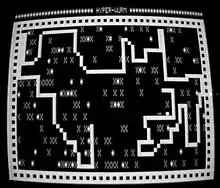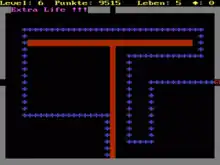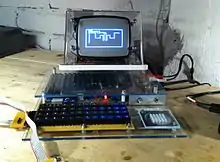Snake (video game genre)
Snake is the common name for a video game concept where the player maneuvers a line which grows in length, with the line itself being a primary obstacle. The concept originated in the 1976 arcade game Blockade, and the ease of implementing Snake has led to hundreds of versions (some of which have the word snake or worm in the title) for many platforms. After a variant was preloaded on Nokia mobile phones in 1998, there was a resurgence of interest in the snake concept as it found a larger audience. There are over 300 Snake-like games for iOS alone.[2]



Gameplay
The player controls a dot, square, or object on a bordered plane. As it moves forward, it leaves a trail behind, resembling a moving snake. In some games, the end of the trail is in a fixed position, so the snake continually gets longer as it moves. In another common scheme, the snake has a specific length, so there is a moving tail a fixed number of units away from the head. The player loses when the snake runs into the screen border, a trail or other obstacle, or itself.
The Snake concept comes in two major variants:
- In the first, which is most often a two-player game, there are multiple snakes on the playfield. Each player attempts to block the other so the opponent runs into an existing trail and loses. Surround for the Atari 2600 is an example of this type. The Light Cycles segment of the Tron arcade game is a single-player version where the other "snakes" are AI controlled.
- In the second variant, a sole player attempts to eat items by running into them with the head of the snake. Each item eaten makes the snake longer, so avoiding collision with the snake becomes progressively more difficult. Examples: Nibbler, Snake Byte.
History
The Snake design dates back to the arcade game Blockade,[3][4] developed and published by Gremlin in 1976.[5] It was cloned as Bigfoot Bonkers the same year. In 1977, Atari released two Blockade-inspired titles: the arcade game Dominos and Atari VCS game Surround.[6] Surround was one of the nine Atari VCS (later the Atari 2600) launch titles in the United States and was also sold by Sears under the name Chase. That same year, a similar game was launched for the Bally Astrocade as Checkmate.[7]
The first known personal computer version, titled Worm, was programmed in 1978 by Peter Trefonas of the US on the TRS-80,[3] and published by CLOAD magazine in the same year. This was followed shortly afterwards with versions from the same author for the Commodore PET and Apple II. A microcomputer clone of the Hustle arcade game, itself a clone of Blockade, was written by Peter Trefonas in 1979 and published by CLOAD.[8] An authorized version of Hustle was published by Milton Bradley for the TI-99/4A in 1980.[9] In 1982's Snake for the BBC Micro, by Dave Bresnen, the snake is controlled using the left and right arrow keys relative to the direction it is heading in. The snake increases in speed as it gets longer, and there's only one life; one mistake means starting from the beginning.
Nibbler (1982) is a single-player arcade game where the snake fits tightly into a maze, and the gameplay is faster than most snake designs. Another single-player version is part of the 1982 Tron arcade game, themed with light cycles. It reinvigorated the snake concept, and many subsequent games borrowed the light cycle theme.
Starting in 1991, Nibbles was included with MS-DOS for a period of time as a QBasic sample program. In 1992, Rattler Race was released as part of the second Microsoft Entertainment Pack. It adds enemy snakes to the familiar apple-eating gameplay.
Meerca Chase is a snake game available on Neopets.
Slither.io (2016) is a popular multiplayer interpretation of Snake.
In 2017, Google released their version of the game as an easter egg, whenever the phrases "snake", "play snake", "snake game" and "snake video game" are typed.[10]
Nokia phones
Nokia puts Snake on the majority of their phones, using the actual name Snake:
- Snake – The first published by Nokia, for monochrome phones. It was programmed in 1997 by Taneli Armanto of Nokia[11] and introduced on the Nokia 6110.[12]
- Snake II – Included on monochrome phones such as the Nokia 3310 from 2000.
- Snake Xenzia – Included on later-model monochrome phones (and most cheaper colour phones, such as the Series 30 and Series 30+ budget mobile devices).
- Snake EX – Included on colour phones. First introduced with the Nokia 9290 Communicator in 2002. It supports multiplayer through Bluetooth and Infra-Red.
- Snake EX2 – Introduced with the Nokia 3100 in 2003 and included in several Series 40 handsets.
- Snakes – A 3D version designed for the N-Gage in 2005. It featured multiplayer through Bluetooth. Later Nokia started preinstalling it (without multiplayer) on some Nseries smartphones like N70, N73, N80, etc. It can be downloaded from Nokia support pages and played on any S60 device.[13]
- Snake III – A 3D version, different from Snakes. Snake III takes a more living snake approach, rather than the abstract feel of Snakes. An example of a phone with it installed is the Nokia 3250 from 2005, and it supports multiplayer modes via Bluetooth.
- Snakes Subsonic - Sequel to Snakes, released on May 22, 2008 for N-Gage 2.0.
- Snake Xenzia (2017) - First released on the Nokia 3310.[14]
- Snake (2017) - Released with Facebook Messenger (2017)
Legacy
In 1996, Next Generation ranked it number 41 on their "Top 100 Games of All Time", citing the need for both quick reactions and forethought. Due to the game's numerous incarnations, in lieu of a title they listed it as "Snake game" in quotes.[15]
On November 29, 2012, the Museum of Modern Art in New York City announced that the Nokia port of Snake was one of 40 games that the curators wished to add to the museum's collection in the future.[16]
References
- Tieturi 2/1985 ISSN 0780-9778
- "Other Snake Games". Archived from the original on August 18, 2016. Retrieved July 5, 2016.
- Gerard Goggin (2010), Global Mobile Media, Taylor & Francis, p. 101, ISBN 978-0-415-46917-3, retrieved April 7, 2011
- Rusel DeMaria & Johnny L. Wilson (2003). High score!: the illustrated history of electronic games (2 ed.). McGraw-Hill Professional. p. 24. ISBN 0-07-223172-6. Retrieved April 7, 2011.
- "Blockade video game, Gremlin Ind, inc. (1976)". Arcade-history.com. April 4, 2008. Archived from the original on June 11, 2011. Retrieved November 4, 2011.
- Blockade at the Killer List of Videogames
- Rusel DeMaria & Johnny L. Wilson (2003). High score!: the illustrated history of electronic games (2 ed.). McGraw-Hill Professional. p. 48. ISBN 0-07-223172-6.
- "You have 4537 of 4549 known Tandy Radio Shack TRS-80 - Model I games". Archived from the original on August 12, 2011. Retrieved November 4, 2011.
- "Retrogaming Times Monthly 7". My.stratos.net. January 1, 2005. Archived from the original on September 22, 2011. Retrieved November 4, 2011.
- Gesenhues, Amy (September 27, 2017). "Google's latest Easter Egg is a video game that shows up with searches for 'snake' & 'play snake'". Search Engine Land. Retrieved November 1, 2017.
- More, James (January 20, 2009). "History of Nokia part 2: Snake | Nokia Conversations - The official Nokia Blog". Conversations.nokia.com. Archived from the original on July 23, 2011. Retrieved November 4, 2011.
- "Taneli Armanto: Snake Creator Receives Special Recognition". Dexigner. Archived from the original on 2 October 2017. Retrieved 6 March 2013.
- neoncherry (August 12, 2007). "The Unofficial Nokia Gaming Blog: Snakes for S60 Download". Archived from the original on November 1, 2007. Retrieved November 4, 2011.CS1 maint: unfit URL (link)
- Nokia 3310 relaunched today with new version of Snake, archived from the original on 28 June 2017, retrieved 14 June 2017
- "Top 100 Games of All Time". Next Generation. No. 21. Imagine Media. September 1996. pp. 55–56.
- "Archived copy". Archived from the original on September 8, 2015. Retrieved March 24, 2016.CS1 maint: archived copy as title (link)